 Lindblad Expedition’s National Geographic Explorer took part in making history this month when they landed at Franz Josef Land in the Russian Arctic, marking the first time a non-Russian expedition vessel called here since 1928. Guests on the 148-passenger expedition ship spent five days exploring the exceedingly remote and rarely visited archipelago, visiting historic sites, with thrilling encounters with massive walrus and polar bears – one of the most exciting Arctic expeditions ever.
Lindblad Expedition’s National Geographic Explorer took part in making history this month when they landed at Franz Josef Land in the Russian Arctic, marking the first time a non-Russian expedition vessel called here since 1928. Guests on the 148-passenger expedition ship spent five days exploring the exceedingly remote and rarely visited archipelago, visiting historic sites, with thrilling encounters with massive walrus and polar bears – one of the most exciting Arctic expeditions ever.
In stark contrast to the 1596 official discovery by Willem Barents of the Svalbard Archipelago, Franz Josef Land lay in wait for discovery for almost three more centuries. While there may have been some Norwegian hunters to the islands slightly earlier, the official discovery of Franz Josef Land on August 30, 1873 is credited to the Austro-Hungarian expedition of Julius Payer and Carl Weyprecht on the Admiral Tegetthoff. During the expedition the ship was finally locked in the ice, abandoned, and the crew was forced to drag their boats over the frozen sea to open water and eventually to rescue by Russian ships at Novaya Zemlya.

For the next half century Franz Josef Land was the site of many pioneering expeditions both to explore the area and as a launching place to try and reach the North Pole. Expeditions from Austria, Holland, Great Britain, USA, Italy, Russia, and Norway all came to this remote island archipelago, many of them utilizing the very landing at Cape Flora on Northbrook Island that Lindblad Expeditions used today.
On April 15, 1926 Russia issued a decree claiming all lands north of the Russian mainland to the North Pole to be Soviet territory. By the early 1930’s Franz Josef Land was shut off from most of the outside world and, other than a brief occupation by a German weather station during World War II, the entire archipelago has been shrouded in obscurity throughout the Cold War.
Starting in 1990, The Norwegian Polar Institute joined with Russian researchers in several joint summer projects in Franz Josef Land. Russian authorities began to open up access to more foreign scientists and eventually historians and other visitors were allowed access to this seldom-visited area.
